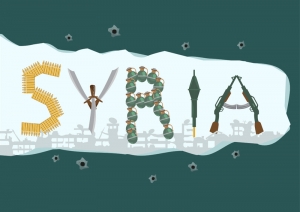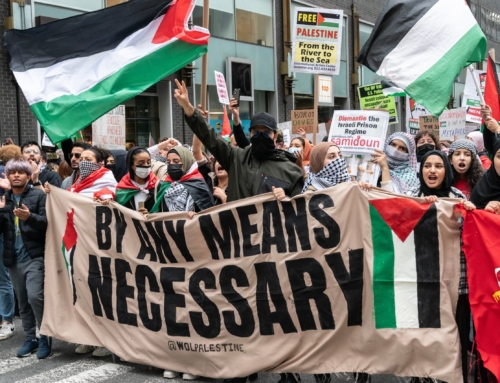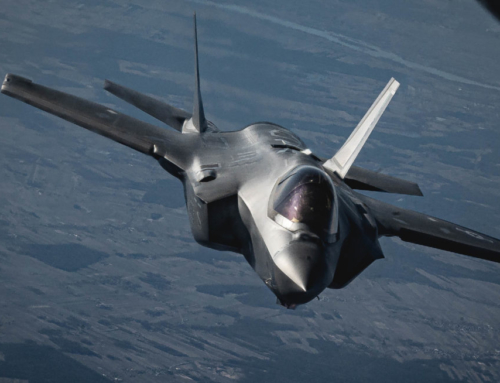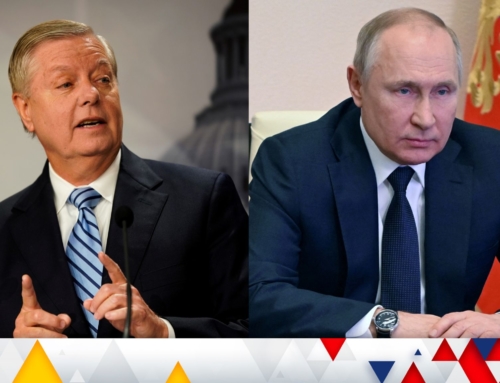
Royalty-free stock vector ID: 211642960
After the latest strikes in Syria, President Donald Trump tweeted, “Mission Accomplished!” Besides the obvious subliminal baggage of using the same term that President George W. Bush used early on in a war in which we’re still embroiled fifteen years later, what, exactly does that mean? What “mission” was accomplished? And I mean beyond the partisan divide. Beyond the left shouting that President Trump was “wagging the dog” to detract from his lawyer’s office raid and FBI Director Comey’s upcoming blistering memoir, and the right shouting that the strike was a stroke of strategic genius that reset every element in the Middle East.
Speaking of wagging the dog, let’s just put that to bed right up front. Yes, President Trump has had a string of bad press, but he didn’t use chemical weapons in Syria. Assad did. And the very fact that both Britain and France were willing to strike unilaterally should completely lay to rest the idea that President Trump was executing solely for personal benefit. To do so stretches the bounds of credibility.
Even given the strike was done because of the heinous actions of the Assad regime, what, exactly, did it accomplish? The answer, unfortunately, is very little. The strike was designed for one thing, and one thing only: to deter Assad from using chemical weapons in the future. The administration has stated repeatedly that it has no interest in regime change, and in fact stated it was withdrawing all US troops in the very near future just one week before the strikes occurred. If there is one lever to deter Assad from doing anything, including using chemical weapons, it is to threaten his survival – and we’ve already given up that card.
Understand, I’m not saying we should conduct regime change, because that answer would entail a wholesale invasion of the country with ground forces, and follow on stability and support operations just like we did in Iraq. Those saying we can just kill Assad with missiles are making the same mistake Obama made in Libya – namely turning the country into a terrorist mecca – only this time, all of the armories that would be looted contain WMD, and we most certainly don’t want Sarin nerve gas to fall into Jihadists hands. Thus, if we want to conduct regime change, it will require securing those chemical sites and stabilizing the country. Very few in the United States would think that was in our best interests, but the fact remains that Assad’s existence is the only lever that will prevent him from using chemical weapons in the future.
In April of 2017, after a Sarin nerve gas attack, we struck an airfield precisely to deter him from further chemical weapon’s use. At that time, I wrote a blog saying that the strike would succeed, and that Assad would be insane to use chemical weapons again. I was wrong. By the administration’s own statement on the current strikes, just weeks after that attack, he used chlorine gas. We did nothing. Since then, he’s used chlorine gas multiple other times, with no response from the international community. Why are we so surprised he used chemical weapons again? In fact, I’m pretty sure it was he who was surprised at the response. After all, we’d let him get away with it on multiple other occasions. What he learned from our 2017 strike was not to use Sarin, but that using lesser chemical agents, like chlorine, was okay, because those garner no response. And even after this latest strike, all we’ve taught him is that he’s safe. Make no mistake; if a situation occurs – like the problem he had in Douma – where chemical weapons will prove decisive, he’ll use them again. The tradeoff is something he’s willing to make.
Douma was the last rebel holdout in the suburbs of Damascus. Assad, with Russian help, had bombed that place with conventional munitions until it was a shell. Hospitals, schools, homes, it didn’t matter what he did, the rebels remained defiant. Until he used chlorine. Shortly after that attack, they were loading up buses and evacuating. He achieved his objective, and all he got in return was a few missiles lobbed his way against targets that were specifically chosen not to affect his hold on power or involve any danger to his allies like Russia or Hezbollah (Iran). A tradeoff he’s more than willing to make in the future.
One of the fears from this strike is that it will escalate into World War Three because Russia will now retaliate in defense of Assad, but that’s absurd. Yes, there’s most definitely a risk if we’d harmed any Russian elements, but we made sure that the targets were clear of such things. Because of it, there is absolutely no reason for Russia to do anything – and they won’t, because they’ve won. Assad is in power, and anything they did against us would jeopardize his ability to remain so, because it would bring us deeper into the conflict. Why would they respond when the administration has publicly stated its desire to completely withdraw? Retaliating against us goes against their best interest, and if anything, Putin is a chess player. The most Russia will do is yell during UN meetings, but even that is a weak jab, given its use of nerve agent in the United Kingdom to kill a double agent. Currently, the world is not very tolerant of Russian statements against retaliation for chemical weapons use, and Putin knows it.
So what can we do if/when Assad uses chemical weapons again? Another airstrike? Rinse and repeat what we did before? We struck three chemical weapons related sites during the latest attack, but by the Pentagon’s own assessment, Assad still has the ability and the stockpiles to use chemical weapons again. Even if we hit them all, chlorine gas isn’t that hard to manufacture. It’s not like Sarin, and it’s a dual-use chemical. Basically, it’s concentrated, weaponized bleach. So what’s the point of striking more suspected chemical facilities? It would only make us look ineffectual and weak to supporters of the Syrian regime–which I personally believe we do to a certain extent inside Syria. But there is something we could hit. It’s something that would mean a great deal to the Assad regime, and would touch upon the regime change theme in a way that would resonate with him. We could strike his means of delivery – meaning absolutely destroy every airfield and air asset he owns.
Assad doesn’t really have an edge when fighting on the ground. Force on force, he’s not much better than the various rebel groups – especially now, after years of conflict honing the battle edges of his enemies. It’s the very reason he used chemicals in Douma. He couldn’t win a conventional fight in that suburb. His only edge is air power – the vaunted barrel bombs – and he uses them with impunity. It’s also the means by which he’s delivered the last few chemical strikes, including the two that caused our retaliation. If we threatened to destroy that, using the chemical weapons rubric as our rationale, it would also threaten his regime, because he cannot win without air power. I believe that would alter his calculus.
This strategy is not without risk, however. Russia has placed elements at every airbase in Syria, precisely as a hedge to get us to hesitate against striking them, so the escalation calculus would be high, but not as high as everyone thinks if Putin believed we were serious about the threat. He doesn’t want to go to war with the United States anymore than we want to go to war with him, and if he believed our resolve was iron clad, he’d pull his men before an imminent strike. Hell, we could call Putin on the phone and tell him we’re about to strike to mitigate the risk – just like we did before the April strike of 2017. It’s not like Assad can hide an airfield, no matter what the Russians told him. The most he could do would be to evacuate his men – which is fine, because that’s not the target.
The key, though, is to telegraph that threat. Our purpose is not to attack, but to deter future chemical weapons use. Thus, we’d have to be specific. The UN ambassador, Nikki Haley, stated that President Trump told her that the US was “locked and loaded” if they used another chemical weapon. This is meaningless. We should be specific on the threat. Telling Assad we are prepared for another round just signals that we’re going to repeat strikes one and two, which Assad would be more than willing to absorb. Deterrence is based on a credible threat against something the targeted country holds dear, along with the will to execute that action. Which means stating the threat up front and projecting the resolve to execute.
In the end, these limited strikes do nothing to justify the phrase “mission accomplished”, but they could, if we threatened something Assad valued in a future strike. The administration’s shown a willingness to use force, which is half the equation. The other half is to target something Assad values – and his air power is a direct line to his ability to maintain his regime. In the same way chlorine is a dual-use chemical – something that’s used for legitimate purposes as well as a weapon – so is his air power. We could threaten that because of his use of air platforms to deliver chemical weapons, and in so doing threaten his regime without overtly stating that is our goal.
Let him figure it out – I’m willing to bet he does.










Thank you Brad Taylor for your insights!! I hope what you have said proves to be 100% true. I only have one question for you: why are you not up there at the right hand of the President?? You are the kind of man we need up there and I really mean that!!
Great post, as usual. I would add that since 2011, Asad has considered this fight to be an existential one. After a shaky start, he is winning with Russian and Iranian help. He will use chemical weapons again if he feels he needs to, and just endure whatever U.S. reaction he provokes. It is a small price to pay for regime survival.
Great job explaining what seems like an excellent response by targeting the airfields! I agree this would actually do something, rather than doing what has been done before with no lasting result. Let’s hope someone believes this is a way to end the chemical weapon threat by Assad for good, and that the military and our President will take action.
Right on target as anyone would expect from you. You make so much sense that I’m quite sure “maddog” and other military minds are thinking along the same track.
Thanks Brad for posting a description of what’s going on in Syria that I can believe and respect.
I also appreciate your passion and knowledge for a realistic solution to the situation that would just be words if it didn’t come from you.